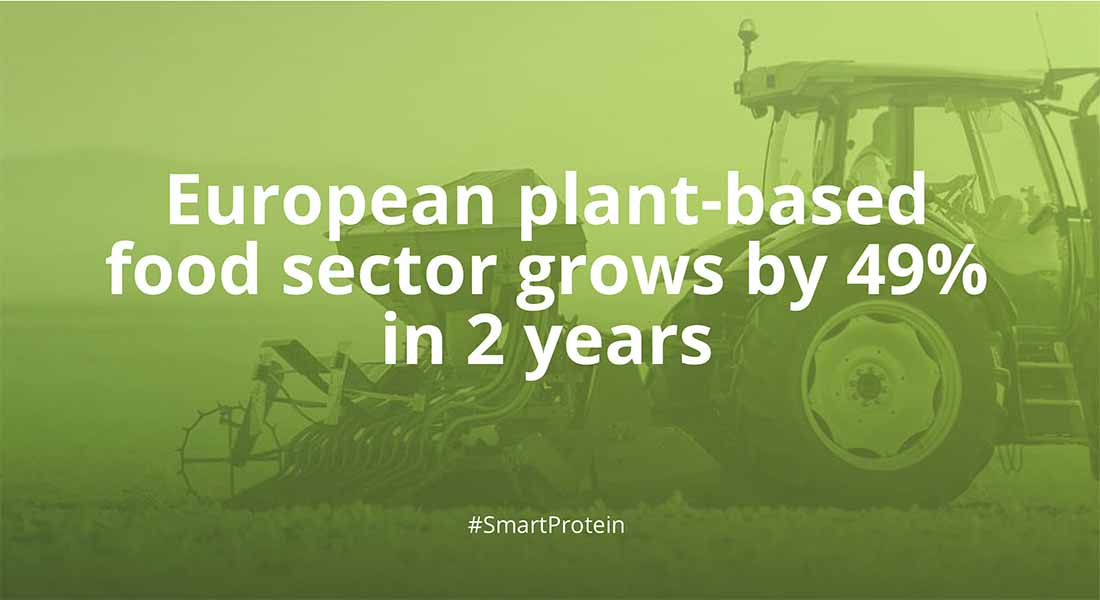EU citizens embrace plant-based foods
A new report shows that the European market for plant-based foods has grown by as much as 49% in just two years. In Denmark, for example, sales value of plant-based meat have increased by 50% over the last two years.

The report contains data collected from supermarkets in 11 European countries over the last three years. It is the largest and most accurate information gathered to date on consumer purchases of plant-based foods in Europe. The report is based on data from Nielsen, which ProVeg-researchers from Smart Protein have processed, and is the first outcome of the project’s Consumer Studies (see below). Smart Protein’s Consumer Studies are coordinated by the Department of Food Science, at the University of Copenhagen.
In Denmark, sales value in the plant-based food sector in the period between October 2019 and September 2020 are led by plant-based milk, at DKK 193 million (26 million €) followed by plant-based yoghurt at DKK 35 million (4.7 million €).
“This data is significant as it provides details of the real growth of the plant-based market. It shows consumer uptake in various categories and countries. It also shows that there is still very little market penetration in Denmark, so there is great business potential,” says Associate Professor Armando Perez-Cueto from the Department of Food Science at the University of Copenhagen.
Associate Professor Perez-Cueto is leading Smart Protein’s Work Package Consumer Studies. ProVeg is responsible for a “consumer trends and benchmarking study”.
The researchers hope their findings will be made use of in the industry’s R&D departments and that the food industry in general will benefit from the research.
“I think that making this information available to everybody, and particularly to SMEs innovating on plant-based products, will increase their competitiveness and chances of success in the market,” says Armando Perez-Cueto. He continues:
“The next step is to conduct a pan-European consumer survey, from which we will be able to identify and profile more precisely consumer segments in relation to plant-based foods. We will also be able to provide specific recommendations for explaining the advantages of such products to those segments. We will thereafter implement behavioural interventions to facilitate the uptake by mainstream consumers.”
In the latest period, between October 2019 and September 2020, the growth rates were higher than in the preceding period, suggesting that the COVID-19 pandemic accelerated the growth of the sector.
Read the press release from Smart Protein
The organisations behind the project
Smart Protein is an EU-funded project of EUR 10 million. It seeks to develop the next generation of foods that are cost-effective, resource-efficient, and nutritious. Alternative protein sources such as legumes and side streams of beer and pasta production are used to generate ingredients, as well as plant-based meats, seafood, dairy products, and baked goods.
ProVeg is an international food awareness organisation working to transform the global food system by replacing conventional animal products with plant-based and cultivated alternatives.
ProVeg works with international decision-making bodies, governments, food producers, investors, the media, and the general public. Its purpose is to help the world move towards a society and economy that is less dependent on animal husbandry and more sustainable for humans, animals, and the planet.
The research is financed by Horizon 2020 – Smart Protein Project GA 862957
Related News
Contact
Associated Professor at the Department of Food Science, University of Copenhagen (UCPH FOOD), Armando Perez-Cueto, apce@food.ku.dk
Or
Communications Officer at UCPH FOOD, Lene Hundborg Koss, lene.h.koss@food.ku.dk
Key findings in EU
- The European plant-based food sector has grown by 49% and reaches a total sales value of €3.6 billion
- The German plant-based meat sector has grown by 226% and reaches a total sales value of €181 million (only vegan meat included)
- Sales of plant-based milk lead the sector in most countries, followed by plant-based meat
- Oat milk leads the plant-based-milk sector with the highest growth rate in most countries
- Plant-based-cheese purchases have grown by 140% in the Netherlands and 77% in Germany
